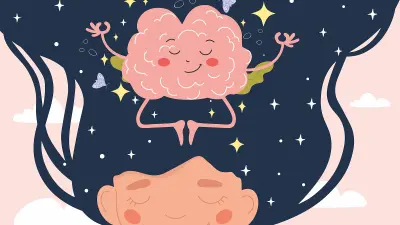If you think sleep is just about recharging your body — think again. Neuroscientist Dr. Andrew Huberman (Stanford School of Medicine) breaks down the science of sleep and dreams in a way that will seriously change how you think about bedtime.
From free therapy sessions to emotion regulation and memory management, here are 7 surprising insights about what’s actually happening while you sleep — and why it matters for both kids and adults.
1. REM Sleep = Free Therapy
“REM sleep is the one that you’re giving yourself every night… a kind of self-induced therapy.” – Dr. Andrew Huberman
During REM sleep, your brain replays intense or emotional experiences — but with one major twist: the chemical epinephrine (aka adrenaline) is turned off. That means you get to revisit and process tough emotions without feeling fear. It’s like your brain is saying: Let’s talk about that hard moment… but this time, it’s safe.
2. Bad Sleep Makes Small Problems Feel Huge
“The lack of REM sleep tends to make people emotionally irritable… We tend to catastrophize small things.”
Ever had a day where everything felt like too much — after a rough night’s sleep? That’s not just being grumpy. Without REM sleep, your brain struggles to regulate emotions, leading to mood swings, overreactions, and overwhelm.
3. Your Brain Sorts Out What Matters While You Dream
“REM sleep is where we establish emotional load and discard meanings that are irrelevant.”
REM sleep helps you connect dots, assign meaning, and filter out what doesn’t matter. It’s your brain’s version of spring cleaning — organizing what to keep, what to toss, and what to emotionally move on from.
4. Missing REM Sleep Can Cause Hallucinations
Not getting enough REM sleep? Your brain may start dreaming while you’re awake. Prolonged REM deprivation can lead to hallucinations and distorted thinking, as your brain scrambles to process stored-up dream data.
5. REM Sleep Works Like EMDR and Ketamine Therapy
Eye movement therapy (EMDR) and ketamine-assisted treatments both help people detach emotional pain from trauma. Dr. Huberman points out that REM sleep naturally does the same thing — using eye movements, memory replay, and chemical shifts to ease emotional intensity.
6. Lifting Weights = Better Deep Sleep
“Resistance exercise… can increase the amount of slow wave sleep.”
Want better memory and focus? Try strength training. Lifting weights (or even bodyweight training) boosts slow wave sleep, which helps your brain lock in detailed learning from the day.
7. Sleep Consistency > Sleep Quantity
“Getting 6.5 hours consistently is better than sleeping 8-10 hours randomly.”
Turns out, a steady routine beats sleeping more. Your brain loves patterns, so sticking to a consistent bedtime — even if it’s less than the mythical 8 hours — leads to better emotional and cognitive performance.
Sweet Dreams!
Sleep isn’t just a break — it’s a full-on mental, emotional, and neurological reboot. Whether you’re a parent managing a child’s sleep schedule or someone trying to optimize your own routine, understanding these behind-the-scenes processes makes bedtime a whole lot more meaningful.








Leave a Reply